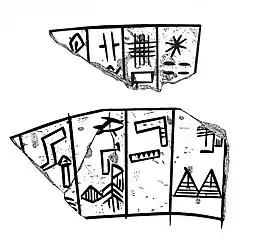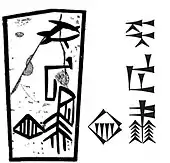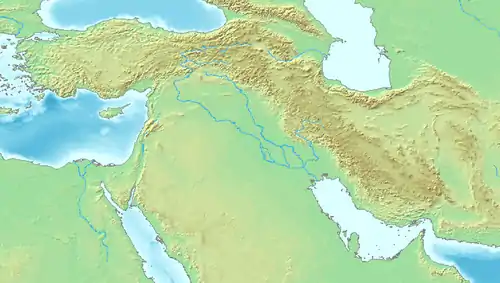Uhub
Uhub (Sumerian: 𒌑𒄸, u2-hub2),[5] (c. 2600 BCE), was Ensi (Governor) of the Sumerian city-state of Kish before Mesilim[6][7]
| Uhub | |
|---|---|
| Governor of Kish | |
 | |
| Reign | c. 2600 BCE |
| Successor | Mesilim |
His name is missing from the Sumerian king list, just as the name of Mesilim, who ruled about fifty years later.[8][9] On a vase dedicated to god Zababa, Uhub described himself as victor of Hamazi, a location beyond the Tigris, between the Diyala and lower Zab regions.[10][9] The first inscription has been reconstructed as 𒀭𒍝𒈠𒈠 / 𒌑𒄸 / 𒑐𒋼𒋛 / 𒆧𒆠, Zamama, Uhub ensi kish-ki "Zababa, Uhub, Governor of Kish".[11]
Uhub is otherwise known from a few more inscriptions.[12]

 "Hamazi" in the second inscription
"Hamazi" in the second inscription
See also
References
- First fragment: "CDLI-Archival View". cdli.ucla.edu.
- Second fragment: "CDLI-Archival View". cdli.ucla.edu.
- "Collections Online British Museum". www.britishmuseum.org.
- Thureau-Dangin, F. (François) (1905). Les inscriptions de Sumer et d'Akkad, transcription et traduction. Paris, Leroux. p. 229.
- "CDLI-Found Texts". cdli.ucla.edu.
- Liverani, Mario (2013). The Ancient Near East: History, Society and Economy. Routledge. p. 110. ISBN 978-1-134-75084-9.
- Orientalia: Vol.48. Gregorian Biblical BookShop. p. 15.
- Panitschek, Peter (2008). LUGAL, šarru, basileús: Von der Uruk-Zeit bis Ur III (in German). Peter Lang. p. 41. ISBN 978-3-631-56194-2.
- Roux, Georges (2015). La Mésopotamie. Essai d'histoire politique, économique et culturelle (in French). Le Seuil. p. 128. ISBN 978-2-02-129163-6.
- Roux, Georges (1990). Mesopotamia: historia política, económica y cultural (in Spanish). Ediciones AKAL. p. 155. ISBN 978-84-7600-174-5.
- Hilprecht, H. V. (Hermann Vollrat) (1892). The Babylonian Expedition of the University of Pennsylvania. Series A: Cuneiform texts. Philadelphia : Dept. of Archaeology, University of Pennsylvania. p. 49 Note 2.
- "CDLI-Found Texts". cdli.ucla.edu.
- "CDLI-Archival View". cdli.ucla.edu.
- "Collections Online British Museum". www.britishmuseum.org.
- Thureau-Dangin, F. (François) (1905). Les inscriptions de Sumer et d'Akkad, transcription et traduction. Paris, Leroux. p. 229.
Bibliography
- Vojtech Zamarovský, Na počiatku bol Sumer, Mladé letá, 1968 Bratislava
- Plamen Rusev, Mesalim, Lugal Na Kish: Politicheska Istoriia Na Ranen Shumer (XXVIII-XXVI V. Pr. N. E.), Faber, 2001 (LanguageBulgarian) [(Mesalim, Lugal of Kish. Political History of Early Sumer (XXVIII–XXVI century BC.)]
This article is issued from Wikipedia. The text is licensed under Creative Commons - Attribution - Sharealike. Additional terms may apply for the media files.
